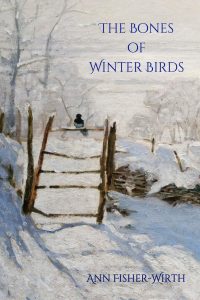
 “Nothing Was Simply One Thing”
“Nothing Was Simply One Thing”
The Bones of Winter Birds by Ann Fisher-Wirth
Review by Cammy Thomas
Ann Fisher-Wirth is an accomplished writer, scholar, and Fulbright recipient. A professor at the University of Mississippi, she has written many books of poetry and prose, including co-editing The Ecopoetry Anthology with Laura-Gray Street (Trinity UP, 2013). The Bones of Winter Birds is her most recent book of poems.
I read this book with an eerie sense of recognition. Like Ann Fisher-Wirth, I have lived in Mississippi, learned French, loved Virginia Woolf’s To the Lighthouse, had a mysterious sibling, been to the home of Georgia O’Keefe. Perhaps my sense of recognition has less to do with shared life experiences than with the intensity of Fisher-Wirth’s description—which she then carefully turns to account. In the poem, “Sumac,” for instance, the flowers are first vividly themselves, and then become agents of destruction:
Brilliant stems of sumac in a jam jar, black-eyed Susans—scarlet
tangled with gold—and blue ageratum, dusty Queen Anne’s lace—
the flowers he brought when our son was born, and I loved them,
copious and wild, from the fields and hedgerows of the farm we lived on,
though by evening the acid sumac had killed everything, turned the water
rank and tannic.
Perhaps we think at this point that the poem will be about a horrible husband who turns sweet things rank, but it’s not about the husband at all. It’s about the intense mixture of pain and joy aroused by our children. The poem’s long lines help yoke these contrasts together gracefully. The poem concludes:
Driving to the airport today, passing sumac
like tongues of flame among the trees, I remember how pain
gave way to joy, back then, as I lay in my stitched cocoon of milk
and blood, the baby nestled on my chest listening as he had
listened all those summer months to the groundswell of my heart. (76)
This admixture of “milk/ and blood” that happens over line breaks infuses the book, appearing again in Fisher-Wirth’s description of her mysterious sister, who is memorialized in the central section of the book. Joan lived in a trailer in Bend, where she collected “sixty-six glass paperweights” in various versions of blue, along with other hoard-able items. Closeted for most of her life, she was always very kind to her younger sister. The particularity of description in “Why Not Left in Peace” makes a tiny novel in seven lines:
Yet, when I was eighteen, her tenderness—
she opened the bathroom door where I was hiding.
Mother told me, she said.
She didn’t say the word pregnant,
just picked up the book I’d dropped.
Don’t worry, Annie, she said.
Someday you’ll write a book like Virginia Woolf. (36)
Pleasure and pain are close cousins here, the unwanted pregnancy, the writer’s ambition, the sister’s tenderness and reassurance, despite her incapacity to fix things—all are blended.
The gentle wavering from one state to another applies also to Fisher-Wirth’s handling of history, as in “Vicksburg National Military Park” (9). The poem begins, “When they were my sons…” This implies they are no longer her sons—but how is that possible? Maybe she means, when her sons were little enough that they seemed to belong completely to her. She describes her closeness to them, how she kisses “their salty eyelids,” and then the poem swerves to Vicksburg, the enormous Civil War battlefield where you can still see the now grassed-over trenches.
Now gingko leaves
make golden blankets
around the tombstone
of a boy from Iowa
and another I can’t read,
and another another
another another another
as far as I can see
scattered across the hillside
this autumn and every
autumn beyond counting.
The poem sweeps out from her tucking her sons into bed, to the deaths of countless boys in wars forever. The short lines of the poem both emphasize each word (“another another another”) and suggest those short lives. History is then, but it’s also now. Past and present are as blended as joy and sorrow. Each son could be one of these sons.
In the world of this book, the past is not separate from the present, nor grief from joy, nor love from distance. As James Ramsay thinks near the end of To the Lighthouse, “nothing was simply one thing.” The Bones of Winter Birds invites the reader to see clearly the contrasting forces always present, and to feel them more deeply.
The Bones of Winter Birds by Ann Fisher-Wirth
Terrapin, 2019, $16.00 paper, ISBN 9781947896116
Cammy Thomas’ book of poems, Cathedral of Wish, received the 2006 Norma Farber First Book Award from The Poetry Society of America. Inscriptions followed in 2014. Both are published by Four Way Books. She lives in Lexington, MA.
